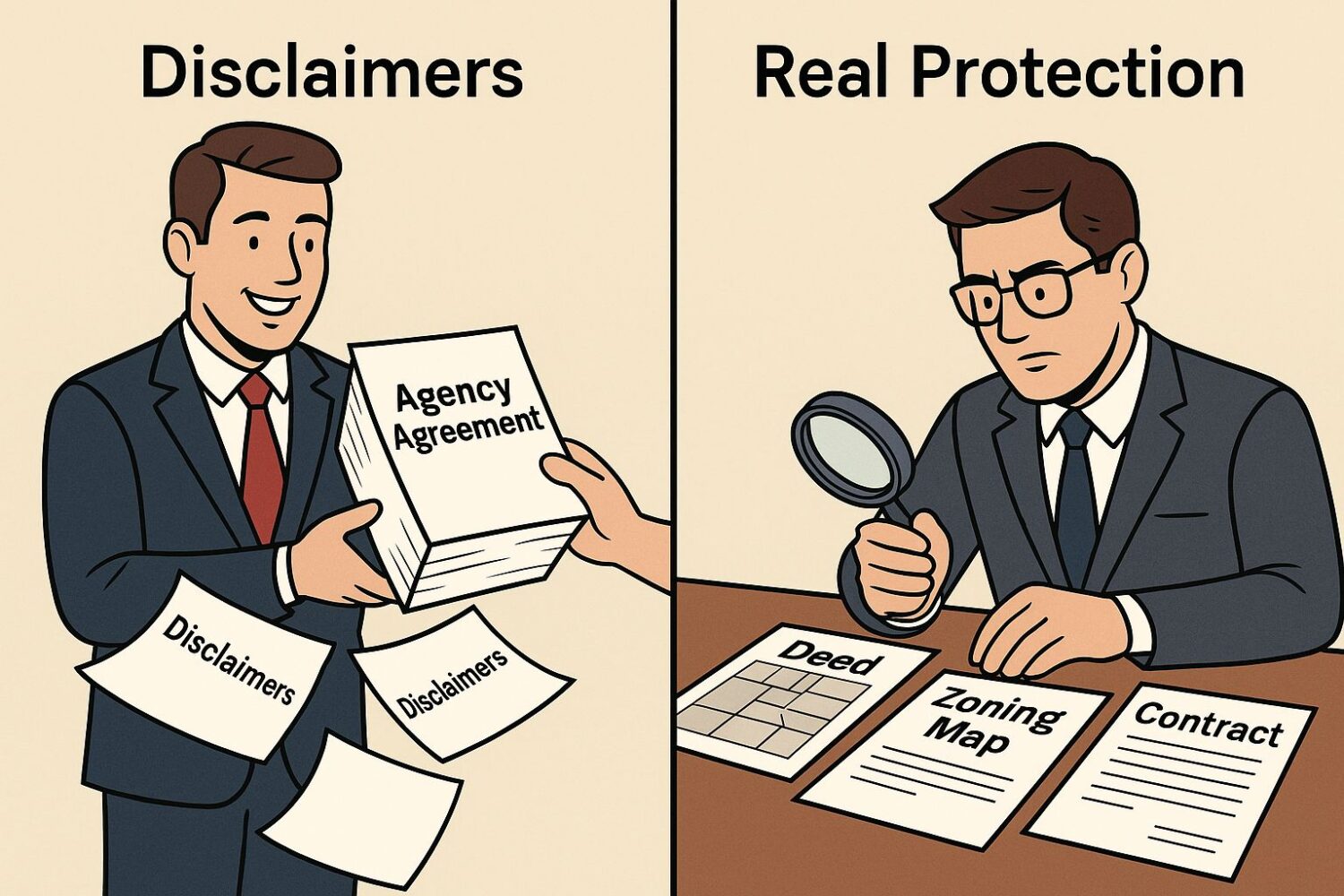Some real estate professionals market themselves as experienced and trusted advisors, but their clients assume all responsibility for investigation and diligence by signing “standard agreements.” Discover why reading the fine print — and perhaps even consulting with a qualified real estate attorney — is crucial in Utah.
Introduction
When working with a real estate professional, most buyers and sellers rely on verbal assurances like “We’ll guide you every step of the way” or “Don’t worry, I’ll handle everything.” In one YouTube video, the real estate professional states their role is to protect you regarding zoning ordinances.
But the reality is this: what matters is not what’s said, but what’s written. And the written agreements most clients sign — such as an Agency Agreement or a Due Diligence Agreement — clearly state that the professional’s role is limited to marketing the property, not investigating its suitability or legality in ANY meaningful way.
Why the Written Agreement Controls
Courts do not enforce slogans or sales pitches. They enforce what the agreement actually says. If you sign a form that shifts responsibility onto you, no amount of verbal assurance will override it.
That’s why buyers must carefully review the fine print before relying on any professional in a transaction.
An Agency Agreement
Perhaps the agency agreement reads:
“The Real Estate Professionals are skilled in real estate marketing. However, they do NOT possess the training or licenses to offer the Buyer professional advice concerning the physical state of any property, nor in relation to legal or tax issues.”
The agreements may caution the reader not to rely on the professional for matters such as:
- Compliance with zoning and building codes
- Physical condition of the property
- Boundaries or square footage
- Availability and location of utilities
Instead, the agreement “strongly recommends” that buyers hire their own inspectors, surveyors, and attorneys.

The Due Diligence Agreement
Another type of agreement that may be introduced is the checklist agreement. This agreement reinforces the same message by guiding clients to seek external expertise on a range of issues, including water rights, radon gas levels, the total number of bedrooms in a home, and even whether the property complies with local zoning ordinances.
One section may have language limiting the real estate professional’s liability:
“Buyer is advised they are solely responsible for all determinations regarding the physical condition of a property.”
This isn’t accidental — it’s written to limit the liability of the professional, not to expand their responsibility.
Real-Life Consequences
Utah court filings show cases where buyers assumed their professional would protect them, only to be left with costly surprises:
- A family told their real estate professional they wanted a home with room to build a workshop. The property they purchased had an easement prohibiting it. Damages: almost $100,000.
- Another buyer was told she was getting “two houses for the price of one” with a rentable accessory unit. The city had barred its use years ago. Damages: hundreds of thousands.
- A buyer purchased a “three-bedroom” home. One room was illegal as a bedroom because it lacked a window. Loss in value: $85,000.
In each case, the agreements on file contained disclaimers limiting the professional’s responsibility.
The Role of an Experienced Real Estate Attorney
Hiring a real estate attorney for your transaction is a lot like scheduling a physical check-up. It takes a little time, costs some money, and often confirms that everything is fine. But just as a check-up can catch hidden health issues before they become serious, an attorney can spot legal and financial risks in a transaction before they cause lasting harm.
The protection you need doesn’t come from a real estate professional’s marketing forms — it comes from a legal review designed to safeguard your interests. An experienced real estate attorney can:
- Review agency agreements and checklists so you understand exactly what is (and isn’t) covered.
- Examine title reports, easements, and zoning restrictions to confirm the property can be used the way you intend.
- Guide you through true due diligence, going beyond the disclaimers and boilerplate.
- Step in early to prevent mistakes that could cost tens of thousands of dollars to fix later.
Like a check-up, it may seem optional in the moment — but in the long run, it can be the decision that protects your financial health.
Conclusion
Don’t assume that reassuring words from a real estate professional translate into legal protection. Always read the agreement carefully to understand its terms.
Agency agreements and due diligence checklists are carefully drafted to limit liability, not expand it. Before you sign, make sure you understand exactly what’s in writing — and consider consulting an attorney whose duty is to protect your interests.
If you’re entering a Utah real estate transaction, don’t rely solely on contracts written to protect others. Contact Keane Law today to review your agreements and safeguard your due diligence.
